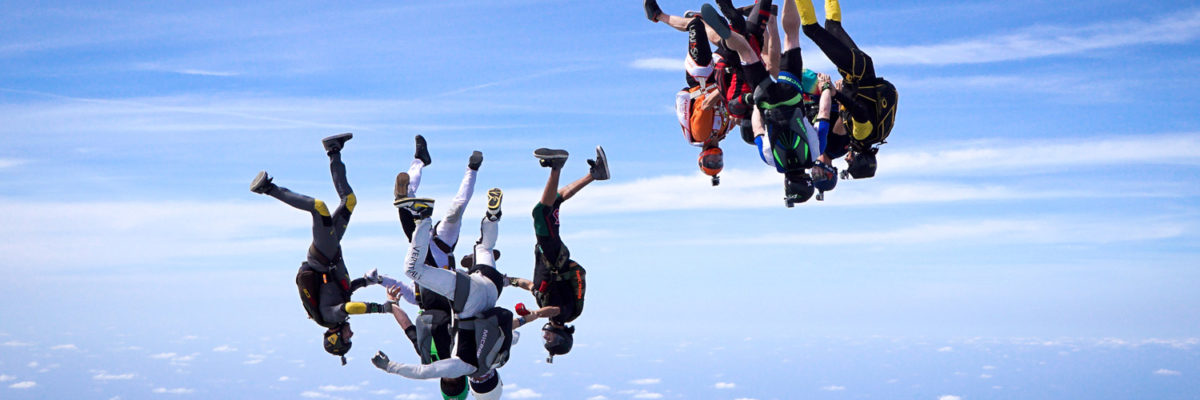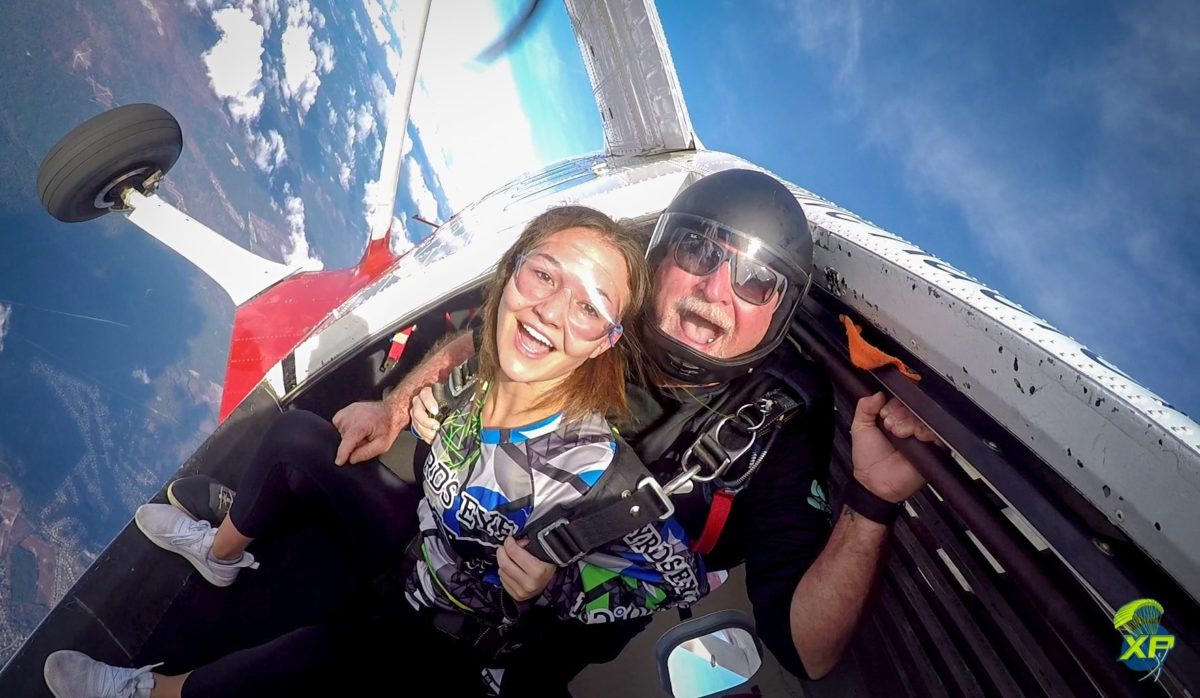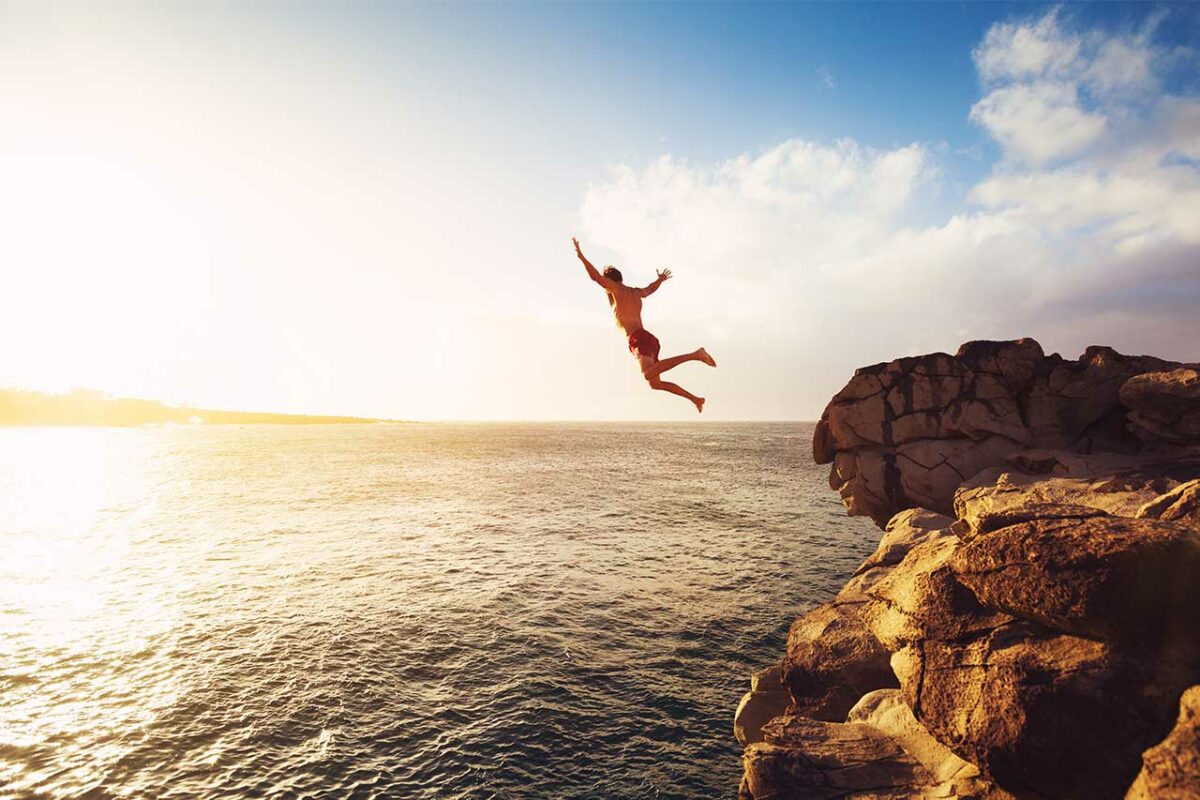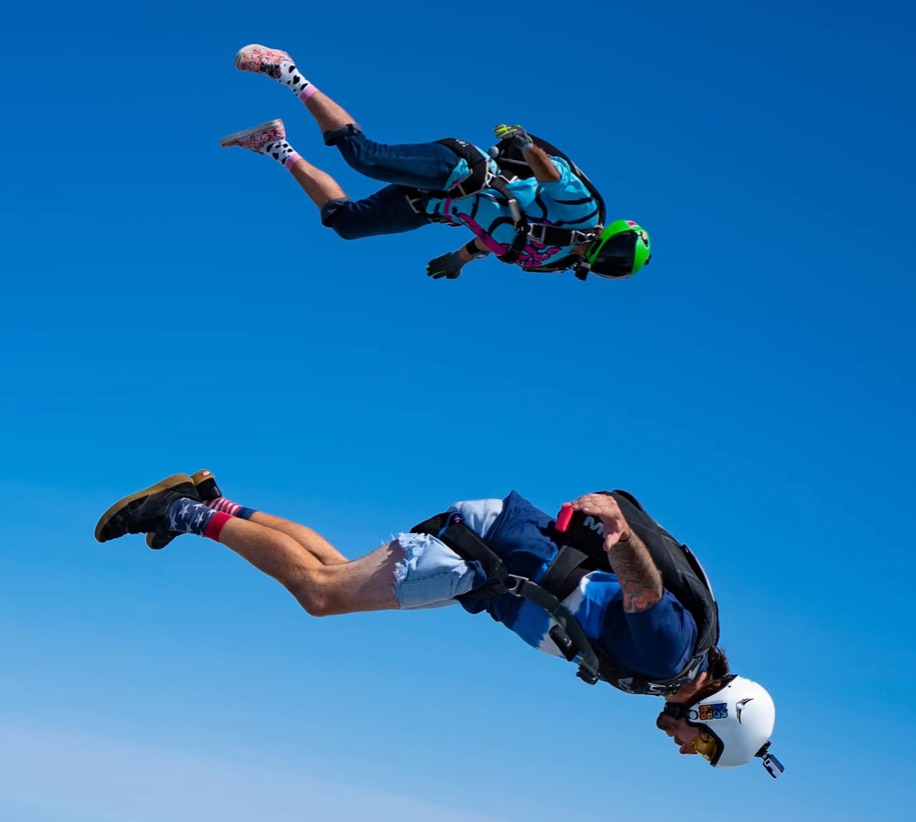
How Does Skydiving Compare to Other Extreme Sports?
Friday, December 15, 2023
- Team FlyXP
- 12/15/23
- 0
- Skydiving
Is skydiving an extreme sport? Skydiving has long been a staple of extreme sports and perhaps one of the first activities people think of when they hear the words, “extreme sport”. Skydiving provides the ultimate adrenaline rush as adventure-seekers freefall from an aircraft at staggering heights. While skydiving is just about as extreme as you can get, it isn’t the only extreme sport.
What Hobbies are Similar to Skydiving?
What are three other sports that involve jumping? Bungee jumping, cliff jumping, and BASE jumping are all extreme sports like skydiving that include jumping from an object (whether in motion or not) and all feature their own prospective freefalls. But how do they compare to skydiving when it comes to accessibility, training requirements, risk elements/safety records, and community?

Bungee Jumping
Plunging into Adrenaline-Packed Freefall
The similarities between skydiving and bungee jumping extend to the pure thrill of freefall, but the differences emerge in the canopy ride that you get with skydiving. Bungee jumping takes place from a low altitude when compared to skydiving, making it seem like a “safer” starting point for those who are new to extreme sports that involve heights. Both extreme sports boast relatively low accident rates, but when it comes to safety equipment and protocols, they differ significantly. Skydivers rely on a two-parachute system with back-up measures in place in the rare case of a malfunction; whereas, bungee jumpers depend solely on specialized cords.
– Accessibility
There aren’t many requirements to go bungee jumping and no experience is necessary. All equipment is included.
– Training
Training for bungee jumping is comparatively brief, emphasizing proper body positioning and safety protocols.
– Safety
Bungee jumping is generally considered safe when conducted under proper supervision, however, there is a risk of equipment failure or a miscalculation that could be deadly with no back-up measures in place. Without a governing body, there aren’t official safety statistics, but estimates suggest a fatality rate of 1 in 500,000 bungee jumps.
– Community
Sport bungee jumping is a significantly smaller community when compared to the skydiving community. However, these communities are tight-knit.
Cliff Jumping
Nature’s High-Dive
Cliff jumping is a sport that blends nature and pure adrenaline. This sport shares the essence of freefall with skydiving yet lacks the structured safety measures of skydiving and the bliss of the parachute ride, of course. Cliff jumping normally involves someone jumping off of a cliff into a body of water, braving the elements and succumbing to Mother Nature’s grasp. The risk element is a bit higher due to the unpredictable environment, which makes the thrill unparalleled.
– Accessibility
Accessibility can be a bit tricky, demanding a higher skill level to access limited natural cliff-jumping sites. Not to mention, cliff jumping is prohibited by law in some areas. Equipment needs for cliff jumping are minimal – perhaps just a study pair of shoes or water shoes.
– Training
Training, while informal, is absolutely paramount and can be the difference between life and death. Most cliff diving injuries are attributed to the water entry and entry positions. Learning proper diving techniques and ensuring that your swimming skills are at expert level are absolutely necessary to cliff dive.
– Safety
It’s hard to measure the safety statistics of cliff jumping as most are off the record. However, there have been many injuries and deaths reported from cliff jumping; typically in the dozens range in the US alone. The unstructured safety measures associated with cliff jumping alone should be a huge red flag when it comes to assessing the high-level risk.
– Community
One of the biggest rules of cliff jumping is to not jump alone. So, while the community is small and decentralized, they are pretty tight-knit, sharing unique cliff jumping sites around the world. The community of dedicated cliff jumpers will travel the globe to jump different spots with fellow jumpers from all over the world.

BASE Jumping
Bridging Earth and Sky
BASE jumping shares the aerial excitement with skydiving but on a more intimate (and risky) scale. Both involve jumping from elevated points, yet BASE jumping typically occurs from a fixed object like cliffs, bridges, or buildings. BASE jumping and skydiving also share the similarity of operating and landing a parachute.
– Accessibility
The requirements to be able to BASE jump are extensive. Reputable BASE jumping schools actually require a minimum of 200 to 500 skydives before being able to BASE jump. The equipment required to skydive is expensive and can be hard to find! Just to start BASE jumping will cost you a minimum of a few thousand dollars, and that doesn’t even include traveling costs to specific BASE jumping sites. Yikes!
– Training
Extensive training is absolutely mandatory, emphasizing precision and control. Most places require you to go through a comprehensive schooling in order to BASE jump.
– Safety
Safety records reflect the increased risk associated with BASE jumping, and it is often considered one of the more dangerous extreme sports. BASE jumping doesn’t have a governing body either, but research indicates a fatality rate of 1 in 2,300.
– Community
The BASE jumping community is essentially a sub-community of skydivers. A tight-knit community with experienced jumpers guiding newcomers through the complexities of the sport.
How Does Skydiving Compare to Other Extreme Sports?
1. Skydiving is More Accessible Than Other Extreme Sports
Unlike some of its adrenaline-pumping counterparts, the entry to the skies is granted much easier in skydiving than in other freefalling activities. Most sports that are considered extreme usually require a decent amount of prior experience, skill-building, and preparation before you can even approach them.
In skydiving, specifically tandem skydiving, it is totally possible to simply arrive at the dropzone and jump that day. All gear is included with the purchase of a tandem skydive. And as a safety precaution, we require all tandem jumpers to attend a 30 minute safety briefing to discuss freefall body position, aircraft exit procedures, and answer any questions you may have.

2. Skydiving Collects & Reports Safety Statistics
Skydiving has oversight from both the United States Parachute Association (USPA) and the Federal Aviation Administration (FAA). The USPA has long mandated safety measures regarding dropzone operations and skydiving equipment, and requires extensive certification training for instructors. The USPA has kept comprehensive safety data since the 60s, providing an overview of safety statistics for licensed and tandem skydiving. In 2022, skydiving had a fatality rate of about 1 in 200,000 jumps among licensed skydivers. The 10 year average fatality rate of tandem skydiving is 1 in 500,000.
3. Skydiving Has a Welcoming Community
Beyond the adrenaline rush, the real magic of skydiving lies in the unparalleled sense of community. The skydiving community is known for its warmth, friendliness, and inclusivity. Unlike the more individualistic nature of some extreme sports, skydiving fosters a welcoming environment that strives to uplift and support each other whether in the sky or on the ground. Whether you are a seasoned jumper or a novice, the camaraderie at Skydive Paraclete XP is palpable – embracing newcomers and creating an atmosphere of passion for the sport. This collective spirit of support further enhances the overall skydiving experience, making it not just an adventure but a shared journey among like-minded enthusiasts.
Regardless, skydiving and other extreme sports have a way of impacting our brains like nothing else in this world – it’s what makes them so addictive! So why not try out the most accessible, safety-conscious, and rewarding extreme sport of all?! Come skydive with one of the most reputable dropzones in the world, Skydive Paraclete XP! Blue skies.
Tags: skydiving
Copyright © 2025, Skydive Paraclete XP, All Rights Reserved.
DropZone Web Design & Marketing by Beyond Marketing, LLC
